- Home
- Jane Peart
Gallant Bride Page 2
Gallant Bride Read online
Page 2
“And how did he happen upon my camp?”
“Told me he’d been mining in the high country on his own claim and was coming out on his way to get new supplies, and,” he mused, “he seemed to be in a hurry to get to the assayer’s office. Seems like he’d run into a storm, one of those fierce ones that sometimes roar in out of the northwest this time of year—icy rain, wind, snow. He stopped to take shelter in what he took to be a deserted mine shack. Then he found you, out of your head with fever. Said he did what little he could for you there, but when the storm was over, didn’t feel right leaving you behind. So he bundled you up and brought you to the first ranch house on the trail. That’s how you ended up here.”
“Well, it sounds as if my luck hasn’t completely run out.” The man attempted another smile and put out his hand toward Jed. “I am most grateful, sir.”
His voice was deep, warm, exciting, with a soft quality Blythe had never heard in a man before.
“I’m Malcolm Montrose,” he said.
Jed grasped his hand in a hearty clasp. “Jedediah Dorman, and my daughter, Blythe.”
The stranger turned his head and smiled at Blythe, and she felt her heart literally turn over. Color rushed into her cheeks, and she lowered her eyes shyly.
Addressing Jed once again, Malcolm asked, “This man … the … prospector … he didn’t bring anything else out, did he?”
“Yes, a canvas knapsack. I’ll get it.” Jed rose, took a few steps to the corner of the room, and retrieved the bundle.
“And this was all?” Malcolm persisted, his fingers fumbling with the buckles.
“That’s all. I suppose your cooking gear and mining paraphernalia are still at your campsite.”
“None of that matters. I was going to leave most ofthat stuff when I walked out—leave it for the next fool looking for the pot of gold at the end of the rainbow!” He shrugged and started pulling out the contents of the knapsack.
“Maybe Blythe and I best leave you alone to sort through your things in private,” Jed suggested.
“No need. There’s nothing much here—a log I started to keep, a few letters, books—” He was strewing things haphazardly on the counterpane.
Blythe noticed a book with a strange title, The Idylls of the King, and a New Testament. She looked over at Pa, wondering if he had seen them, too. She knew he would be glad for the chance to talk with an educated man.
Having emptied the satchel of its contents, Malcolm leaned back against the pülows, looking pale and drained. “Well, he got it,” he announced.
“What’s that?”
“The gold.”
“Gold! But he said—” Jed pounded a clenched fist into his open palm. “I should have known! Why, even Blythe—” He was furious, more at himself than at the scoundrel who had gotten away, she knew. “Mulligan seemed edgy, itching to go—”
“Nearly half a year’s hard digging. All gone. What a waste—” Malcolme voice trailed off in despair. “Last May, my partner and I divided up our findings thus far. He’d had enough ofthat cruel life … wanted to get back to his wife, his family … but I decided to stay. … Needed more gold. … But … it was for nothing.”
The room was heavy with the silence that followed his words.
Then Jed cleared his throat. “Well, man, you got out with your life, remember that. Ifs a wonder old Mulligan didn’t slit your throat before he made off with the gold. Don’t forget to count some of your blessings.”
Malcolm closed his eyes wearily and gave a short laugh. Blythe thought she had never heard anything so mirthless and devoid of joy. “You’re right, of course. I’m alive … for whatever that’s worth.'’
“Now, that^s enough for now. You still haven’t got your strength back full. Blythe, isn’t there some stew simmering in the pot? How about dishing up a little for Mr. Montrose.”
In the days that followed, Blythe’s interest in their strange “guest” grew rapidly. Who was he and where did he come from? It was such a mystery. He was totally unlike anyone Blythe had ever known. Certainly, he was different from the miners and ranchers of Lucas Valley.
She thought he was as handsome as any prince pictured in the fairytale books Pa had ordered by mail for her when she was a little girl. During his illness Pa had cut the man’s beard, and clean-shaven, he was even more handsome. His dark hair swept back from a high forehead in deep waves; even though his face was thin, his features were noble.
His manner was reserved, respectful toward Jed, gende toward Blythe, and he was so appreciative of everything that was done for him, but he seemed sad much of the time, and Blythe delighted in doing little things to make him happy, see him smile.
He was all she had ever imagined in a romantic hero, the kind who rode on a white steed straight out of a storybook to rescue a fair maiden. In her imagination, she was the maiden, Malcolm the brave knight.
When he was at last able to move about, sitting for short periods in a rocker on the front porch, she saw that he was very tall—even taller than Pa. Though he was still painfully thin, the breadth of his shoulders bespoke a once magnificent physique, and his rare smiles revealed fine white teeth.
One day he asked if he might read one of the Dickens books from the shelf, and she had happily selected David Copperfield.
“How did you happen to come by these books, Blythe?” he asked, paging through the volume.
“Papa sent away to a bookseller’s in New York. Since I can’t get into the school in town in wintertime, he wanted me to have them to keep up with the town students,” she reported. “I use them to copy my letters, practice my penmanship by writing out whole chapters, and, of course, improve my reading skills.” Then she added shyly, “David Copperfield is my favorite. Except it is so sad. I hated it when Dora died … she was so sweet and lovely.”
Malcolm’s eyes clouded for a second. Then, looking down at the book in his hand, he said, almost to himself, “Dickens writes about life, Blyihe. And in life some of the sweetest, some of the loveliest things … die.”
The mood of melancholy passed, and Malcolm flashed his wonderful smile. “Thank you, Blythe,” he said. “I shall enjoy reading this again.”
He went back into the bedroom and closed the door, leaving her dazzled and dreamy.
chapter
3
ON AN EARLY FALL AFTERNOON in late spring, Blythe, riding her mare Milly home from school, took a shortcut through the grove of aspens on the other side of the creek that ran through the Dorman property.
She enjoyed school because soon the long winter’s snows would prevent her regular attendance. Often the schoolmarm let her help the younger children with their sums and reading. Blythe loved children, had often longed for brothers and sisters. It had been lonely growing up alone on an isolated ranch. Lonely, that is, until Malcolm had come.
This winter promised to be different even if they were snowbound. If Malcolm stayed, that would make a difference. He and Pa got along well; in the long evenings they played checkers or discussed books. Pa was a great reader. Sometimes Malcolm read aloud in his deep, rich voice with its soft accent. Blythe loved those times best, listening to Malcolm read, often from his favorite Tennyson book, The Idylls of the King.
At the edge of the creek, obeying an irresistible impulse, Blythe slid off the horse and let her drink. Then she stripped offner stockings and shoes, bunched up her skirt, and tucked it into her waistband. She stuffed her shoes and stockings into her saddlebag and waded into the creek, wrinkling her nose with pleasure as the cool water swished around her ankles and feet.
Reaching the bank on the other side, she scrambled out and looked up. To her surprise she saw Malcolm sitting under a tree, leaning against the trunk, a half-open book in his lap. He was grinning at her.
Mortified to be caught with her skirts above her knees, she let them fall, and to cover her embarrassment, she asked, “What are you reading?”
He held up the book so she could see the tide.
“I
dylls of the King—again?”
“I never get tired of it—it’s one of my favorites.”
Oh, mine, too!” she quickly agreed. “I love hearing all those wonderful stories of bravery and honor. I wish people still did things like that, believed like that.”
“Some do-” Malcolm smiled sadly.
Blythe sat down on the grass beside him and wiggled her toes in the cool grass.
“Was that fun? Wading?” Malcolm asked.
“Oh, yes!” she confessed, laughing.
“My brothers and I used to do the same thing the first days of summer—often losing a shoe or stockings in the attempt.”
“How many brothers have you?”
“Two. That is, I had two.”
Blythe, busily putting on her shoes and stockings, failed to see the shadow that crossed Malcolm’s face.
“That must have been nice … growing up in a family, I mean,” she hurried on. “I have always longed for brothers and sisters. But Pa declared he would never remarry after my mother died, and so—”
“I can understand that,” he said quietly.
Concentrating on lacing her shoes, she did not look up. ‘Tell me about your family, Malcolm, about your home. Pa says he knows only that you come from Virginia. Do you know I have never been out of California? As a matter of fact, I’ve never been anywhere but Sacramento and Lucas Valley.”
“You’re still young, Blythe. You’ve your whole life ahead of you to travel, to see the world.”
“Yes, I know,” she sighed. “Pa says when I’m sixteen or maybe eighteen, we will go first to San Francisco, then—” she laughed gaily, “—who knows? Maybe to Europe or Egypt or the Holy Land.”
“How old are you, Blythe?”
“Fifteen.”
Malcolm looked at her with a certain wistfulness.
“Have you ever been to Europe, Malcolm?”
“Yes, twice. Once when I was a little older than you and then later—” He stopped abruptly. Wincing, he rubbed his forehead.
Bfythe saw it at once. “Malcolm, are you in pain?” she asked anxiously.
“Memories, Blythe. Sometimes memories can be painful.”
“Yes, I suppose they can. Pa has those kinds, too. About Mama.” Blythe cast about for a way of distracting him from his sad thoughts. “You haven’t told me about Virginia, Malcolm. Is it like California?”
“Not really. It’s very different, in fact. Not such wide, open spaces, so few people.” He shifted his position beneath the tree and put his book aside. “My home is called Montclair,” he began. “It’s named after the wife of my ancestor who came to America from Scotland years and years ago. Since her name was Claire, and our family name was Montrose, the two were combined.
“My family has lived there for generations. It’s a beautiful house, Blythe, whitewashed brick—the brick was made right there on the plantation. There are green shutters on all the windows, and those on the first floor are like great doors opening onto die long, front porch.
“Inside, all the rooms are large, with high ceilings, and there are crystal chandeliers and a curved staircase that winds up and around with a banistered balcony that circles the lower entrance.”
“It sounds like a palace!” Blythe murmured in an awed voice.
Malcolm looked at her sharply as if jolted back from a trance. “Yes … yes, I guess it does, though we children never saw it like that. It was just our home, where we grew up. But then later, when it all changed—” Again, his voice took on a somber tone. “Maybe we did live like a kind of royalty, but we didn’t know it… not until it was too late.”
A silence fell that Blythe hesitated to break. Malcolm seemed deep in thought.
“There were acres and acres of meadowlands where our horses grazed—” he continued at last, now speaking slowly, as if seeing the scene unfold before him. “And on the hillsides, sheep. My father was known to stable the best horses in the whole of Mayfield County. There was a huge barn and a coach house, where our carriages were kept—a barouche, a phaeton, a Victoria—all with upholstery imported from Italy and splendid wood and brass fittings.”
“Oh, Malcolm!” Blythe was entranced.
“There are lovely gardens and a velvety green lawn that sweeps down in terraces toward the river. The James River flows by at the end of the plantation. In the early days, ships bringing supplies and furniture from France and England docked there. But after awhile, most of our goods were made right on the grounds by our own people.”
“Your own people?”
“Yes, the black people. Our servants.” He frowned. “Slaves.” He spoke the word as if it left a bitter taste in his mouth.
“Slaves?” echoed Blythe.
“Yes, we owned slaves, Pm sorry to say, though it was the custom and much accepted then. Necessary, really. Anyway, that’s all over now. The War finished it.” He rose and paced resdessly with his hands behind him. “It was wrong, of course,” he admitted. “But that was another lesson learned the hard way. War is a harsh teacher.”
After a long while, Blythe dared a question. “Do you find our life here … stranger”
“No, not strange exactly. Isolated, Fd say. Montclair, too, is in the country, but there is always company, people coming and going, parties, balls, dancing … at least, there used to be—”
“There are parties in Lucas Valley sometimes, Malcolm. Socials. Church suppers. Maybe when you’re better, we could go to town—”
Malcolm laughed shortly. “I don’t think so, Blythe. I’ve lost my taste for that kind of thing, I’m afraid. Besides, I don’t expect to be here much longer.”
“Oh, don’t say that, Malcolm!” Blythe scrambled to her feet and put a restraining hand on his arm.
“I can’t impose on your father’s hospitality forever,” Malcolm said mildly.
“But… Pa wants you to stay, Malcolm. I know he does. And with winter coming on, you can’t go back to your camp.” She rambled on, seeking to persuade him. “You could stay here … with us. There are lots of things you could do to help Pa around the ranch.”
A distant look came into Malcolm’s eyes. “I suppose I have no real place to go—”
“Well, then there’s no hurry to leave, is there?”
He smiled. “Well, I’ll talk to your father, Blythe. I’m getting stronger every day. Maybe I could hire on as a ranch hand. Yes … why not?”
The wind began to rise, and Malcolm shivered and struggled to his feet. “It’s chilly. We’d best be getting back to the house, Blythe. One thing I don’t need is another bout of pneumonia.”
Blythe whisded for her horse. The mare raised her head and shook her mane, but took her time fording the stream to the other side. To entice her, Blythe plucked a crabapple from the pocket of her pinafore and held it out.
She looped her lead around her wrist and led her mare, munching contentedly on the apple, up the hill toward the house. Neither she nor Malcolm spoke again until they reached the corral.
“I’ll setde Milly for the night,” Blythe said. “And-and do please think about what I have said. … Pa needs you … and he’d be so disappointed if you should leave—”
By the time winter gripped the Valley, Malcolm had become a part of the Dorman household. Though he moved out to living quarters Jed fixed for him in the loft of the barn—complete with pot-bellied stove, shelves and a comfortable bunk—he took all his meals with Jed and Blythe. She found herself dreaming up delicious new dishes to tempt his appetite and began to spend almost as much time before the mirror as in the kitchen—doing the best she could to tame her mane of auburn hair and pinch some color into her cheeks before each mealtime. There was little she could do about her wardrobe, though. She was fast outgrowing her daytime calicos. Well, she’d just have to wait until spring and see Mrs. Coppley, a distant neighbor who sometimes did some sewing for her.
She was pleased that Malcolm and her Pa had forged an easy companionship. During the long winter evenings, both men settled i
nto a comfortable routine—reading by lamplight, playing checkers, or merely reminiscing about their mining days. Jed had many stories to share about the hectic “gold-rush days,” but outside that one golden afternoon, when he had told her about Montclair, Malcolm had rarely spoken about the life he lived before coming to California.
When Malcolm was fully restored to health, he worked long hours, mending fences weakened by winter snowbanks, helping with the foaling, taking care of the livestock, and riding out to round up strays that had escaped through broken places in the corral. He was fast becoming Pa’s right hand, and the bond between them grew stronger throughout the winter months.
But for Blythe, who had learned to depend upon his company that winter, the long days of summer threatened to steal away the tenuous relationship she had established with Malcolm. Perhaps he thought of her, not as the ripening woman she was becoming, but as the fanciful child who dreamed of princes and fairy-tale palaces.
chapter
4
ALMOST WITHOUT their knowledge, by the next spring Malcolm had become part of life at the Dorman ranch. He was an indispensable help to Jed. He knew horses and took over that part of the daily work. He liked working in the big vegetable garden as well. Here he often worked alongside Blythe, who basked in his company.
He had gained weight and muscle from the ranch work, and his skin was bronzed from the sun. With his dark hair and extraordinarily blue eyes, he looked more than ever like the storybook prince of Blythe’s daydreams.
She plied him with questions, trying to ferret out the mystery of his background, weaving it in with her own fantasies. She had already dreamed a fairy tale of her own about Malcolm, that one day when she was grown up—eighteen, maybe—he would fall in love with her. Then they would marry and live here on the ranch with Pa happily ever after.
One day, forgetting this vision was only in her own imagination, she asked him how many years older than she he was.
“Too many,” he replied shortly.
“My Pa was years older than my mother, and they got along beautifully, never had a cross word, he said.” She babbled on, unaware of Malcolm’s sudden discomfort.

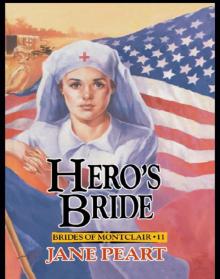 Hero's Bride
Hero's Bride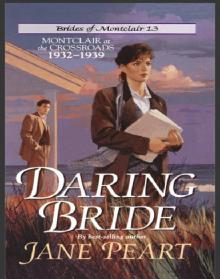 Daring Bride
Daring Bride Runaway Heart
Runaway Heart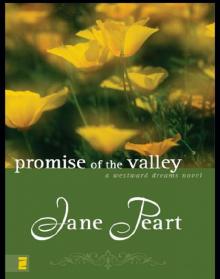 Promise of the Valley
Promise of the Valley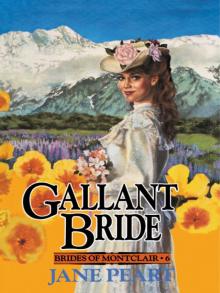 Gallant Bride
Gallant Bride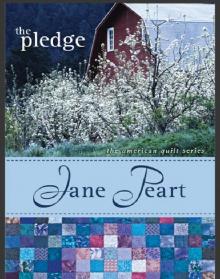 The Pledge, Value
The Pledge, Value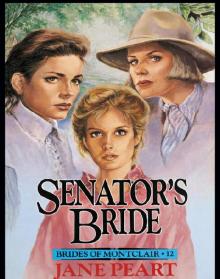 Senator's Bride
Senator's Bride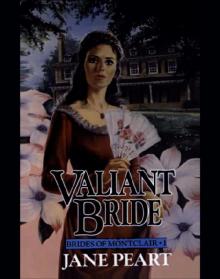 Valiant Bride
Valiant Bride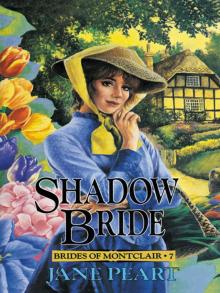 Shadow Bride
Shadow Bride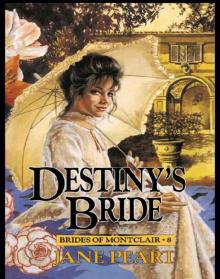 Destiny's Bride
Destiny's Bride A Tangled Web
A Tangled Web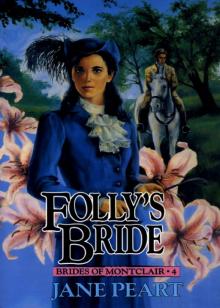 Folly's Bride
Folly's Bride The Promise
The Promise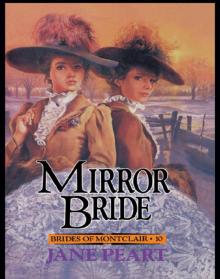 Mirror Bride
Mirror Bride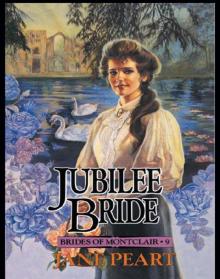 Jubilee Bride
Jubilee Bride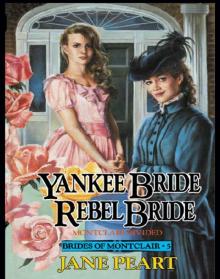 Yankee Bride / Rebel Bride
Yankee Bride / Rebel Bride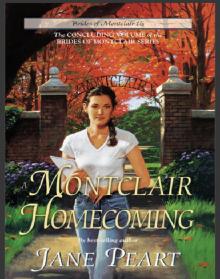 A Montclair Homecoming
A Montclair Homecoming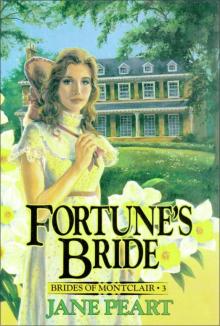 Fortune's Bride
Fortune's Bride Undaunted Spirit
Undaunted Spirit Love Takes Flight
Love Takes Flight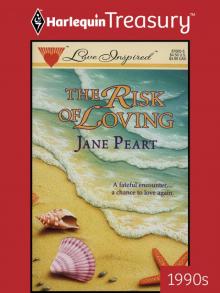 The Risk of Loving
The Risk of Loving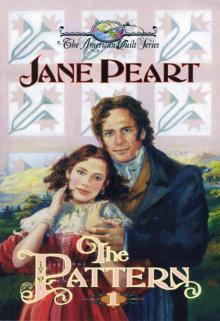 The Pattern
The Pattern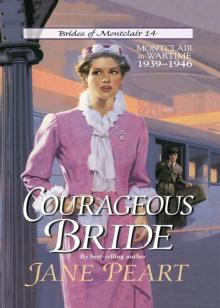 Courageous Bride
Courageous Bride